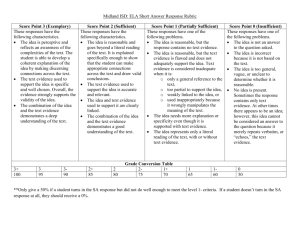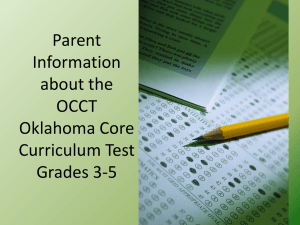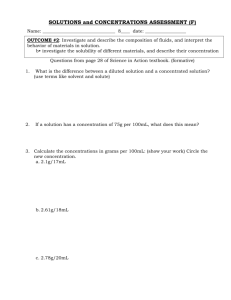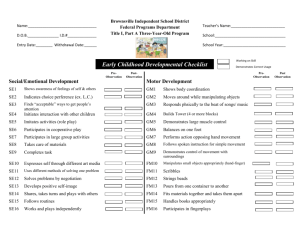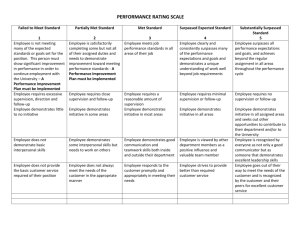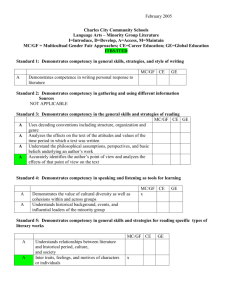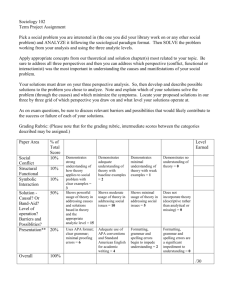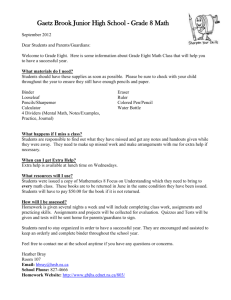Professional Behaviors
advertisement
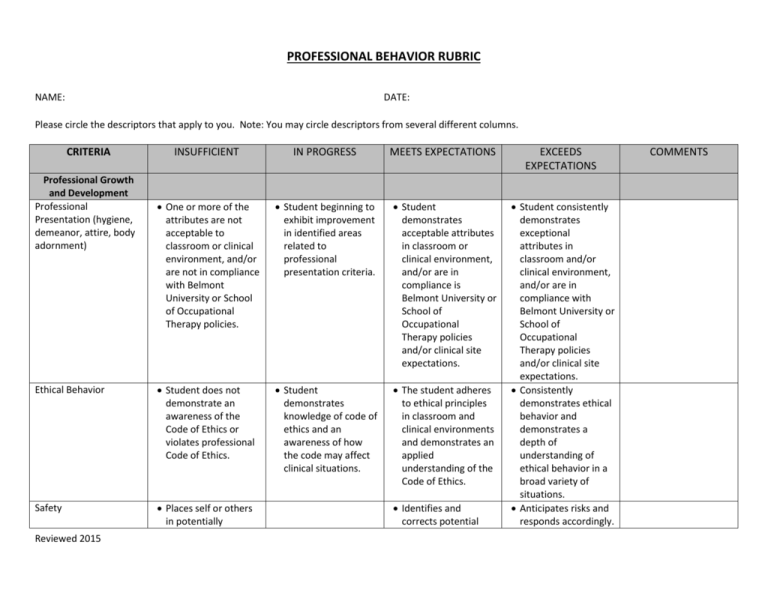
PROFESSIONAL BEHAVIOR RUBRIC NAME: DATE: Please circle the descriptors that apply to you. Note: You may circle descriptors from several different columns. CRITERIA INSUFFICIENT IN PROGRESS MEETS EXPECTATIONS EXCEEDS EXPECTATIONS One or more of the attributes are not acceptable to classroom or clinical environment, and/or are not in compliance with Belmont University or School of Occupational Therapy policies. Student beginning to exhibit improvement in identified areas related to professional presentation criteria. Student demonstrates acceptable attributes in classroom or clinical environment, and/or are in compliance is Belmont University or School of Occupational Therapy policies and/or clinical site expectations. Ethical Behavior Student does not demonstrate an awareness of the Code of Ethics or violates professional Code of Ethics. Student demonstrates knowledge of code of ethics and an awareness of how the code may affect clinical situations. The student adheres to ethical principles in classroom and clinical environments and demonstrates an applied understanding of the Code of Ethics. Safety Places self or others in potentially Student consistently demonstrates exceptional attributes in classroom and/or clinical environment, and/or are in compliance with Belmont University or School of Occupational Therapy policies and/or clinical site expectations. Consistently demonstrates ethical behavior and demonstrates a depth of understanding of ethical behavior in a broad variety of situations. Anticipates risks and responds accordingly. Professional Growth and Development Professional Presentation (hygiene, demeanor, attire, body adornment) Reviewed 2015 Identifies and corrects potential COMMENTS dangerous situation. Eats or drinks in nondesignated areas. Does not adhere to safety guidelines. Professional Identification Student demonstrates difficulty identifying the core values and beliefs of the profession. Student demonstrates knowledge of and articulates the core behavioral values and beliefs of the profession. Professional Communication (includes professional language, social media, written, verbal and nonverbal communication) Is unaware or unable to represent self and/or the discipline of occupational therapy in a positive and/or appropriate manner during nonverbal or verbal communication including electronic communication and social media. Is beginning to represent self and/or the discipline of occupational therapy in a positive and/or appropriate manner during nonverbal or verbal communication including electronic communication and social media. Student does not demonstrate sufficient organizational skills to support successive participation and learning in the Student’s organizational skills are developing but need continued improvement. Learning Behaviors Organizational Skills (preparedness, etc.) Reviewed 2015 safety risks. Reports safety concerns. Stores belongings and supplies properly. Student articulates and demonstrates the core behaviors, values and beliefs of the profession and acknowledges and explains one’s beliefs, values and biases in a professional manner (Fidler). Student consistently represents self and/or the discipline of occupational therapy in a positive and/or appropriate manner during nonverbal or verbal communication including electronic communication and social media. Makes recommendations for enhanced safety. Student demonstrates sufficient organizational skills to support successive participation and learning in the Student consistently demonstrates exceptional organizational skills to support successive participation and learning in the Student consistently demonstrates exceptional use of appropriate professional terminology and language in most classroom discussions and assignments. Self-Initiation/ Proactivity Attitude Toward Learning(enthusiasm, initiative, skills of inquiry, contribution to others, and openness to others) educational and clinical environment. Waits to be informed as to next steps or how to proceed rather than actively seeking resources/solutions. Student lacks a positive and enthusiastic attitude toward learning including personal responsibility for inquiry and incorporating previous learning in both individual and group situations. Problem Identification and Problem Solving Student lacks ability to apply systematic approach to problem solving and decision making, requiring assistance to identify and implement. Group Work Student does not Reviewed 2015 Is beginning to take action when appropriate rather than taking a passive role. Student is developing a positive and enthusiastic attitude toward learning that includes personal responsibility for inquiry and incorporating previous learning but needs continued growth and cues from instructors/ faculty/supervisors. Student is developing knowledge in problem identification, systematic problem solving and decision making but needs guidance and/or cueing from faculty/ instructor/supervisor in order to be effective in addressing problem. Student has difficulty educational and clinical environment. Appropriately and actively utilizes available resources (including self) to take action/be proactive. Student demonstrates a positive and enthusiastic attitude toward learning that includes personal responsibility for inquiry and incorporating previous learning with minimal cues with faculty/ instructors/ supervisors. Student demonstrates effective ability to apply systematic approach to problem solving and decision making, requiring minimal assistance to verify and/or validate with faculty/ instructor/supervisor. Student educational and clinical environment. Student consistently demonstrates a positive attitude toward learning that includes personal responsibility for inquiry and incorporating previous learning. Student actively seeks new learning or service opportunities and offers assistance to peers. Student consistently demonstrates independent ability to apply systematic approach to problem solving and decision making, requiring no assistance to identify and implement. Student consistently Interpersonal Competence Emotional Expression Cultural Sensitivity & Diversity Reviewed 2015 demonstrate the ability to work with others in groups or teams utilizing effective interpersonal and behavioral strategies to attain a common purpose. in several key behaviors for effective team/group work requiring guidance from faculty/instructor/ supervisor to identify and implement effective interpersonal and behavioral strategies to attain a common purpose. demonstrates the ability to work with others in groups or teams utilizing effective interpersonal and behavioral strategies to attain a common purpose with limited guidance required. Insufficient control of emotional expression in the classroom or clinic. Developing control of emotional expression. Does not demonstrate an awareness of the value of diversity or has difficulty getting Demonstrates an increased awareness of the value of diversity and/or demonstrates an Uses a variety of emotional expressions that are appropriate and conducive to promoting interpersonal communication. Treats other people including those of different backgrounds, beliefs, gender, age, and/or demonstrates active and independent ability to work with others in groups or teams utilizing effective interpersonal and behavioral strategies to attain a common purpose. Establishes and maintains cooperative working relationship with others. Approaches tasks with confidence and a positive attitude (smiles when working, sees the best in situations). Demonstrates leadership in assisting others in diversity awareness. Models respect for along with others from different backgrounds, beliefs, gender, age, and/or disability status. improved ability to get along with others from different backgrounds, beliefs, gender, age, and/or disability status. Skills of dialogue need improvement in the area of respect, empathy, and/or active listening. Respect, Empathetic, & Active Listening Skills of dialogue do not covey respect, empathy, and/or active listening. Timeliness & Dependability Is late for appointments and/or class and does not provide acceptable notification. Is seldom late for appointments and/or class and provides acceptable notification. Self-Awareness Unable to identify personal strengths and challenges. Unable to demonstrate weighing of selfassessment with view of others. Dealing with Feedback, Conflict Resolution, & Negotiation Has difficulty engaging in the process needed for self-reflection, asking for clarification, and engaging in negotiation and Needs assistance to identify personal strengths and challenges. Is beginning to actively demonstrate that student is weighing selfassessment with assessment of others. Is beginning to use skills of reflection, asking for clarification, engaging in negotiation and conflict resolution for Reviewed 2015 disability status with respect. diversity to others . Dialogue skills are respectful, empathy skills and/or active listening is displayed as well. Performs tasks in a reliable, responsible, and dependable manner. Keeps scheduled appointments and is on time to class. Identifies personal strengths and challenges. Weighs selfassessment with assessment of others. Uses skills of reflection, asking for clarification, and engaging in negotiation and conflict resolution for a productive working Consistently uses assertive communication to deal with conflict in the classroom. Seeks feedback from others for personal conflict resolution for a productive working relationship. Reviewed 2015 a productive working relationship. relationship. Acknowledges error and takes responsibility for self by altering behavior. growth. Demonstrates tolerance for errors.
